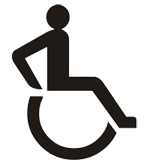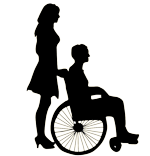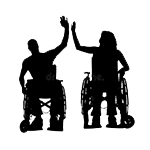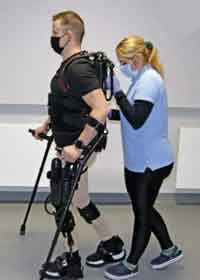Advice for People with Spinal Cord Injuries
 I would like to share my experience and knowledge that I have gained during my long stay in hospitals, observations of my own body, as well as reflections and conclusions from living with paralysis and moving around in a wheelchair. My aim is to help prepare people who have suffered a spinal cord injury, especially in the cervical region, and their families for the new reality they find themselves in, as well as the challenges that await everyone who has been forced by fate to use a wheelchair. Of course, not every situation will be like mine, and not everyone has to agree with me. Many things need time, and nothing should be forced. Everyone has their own character and their own path, but if my advice helps even one person, I will be happy knowing I have done something valuable.
I would like to share my experience and knowledge that I have gained during my long stay in hospitals, observations of my own body, as well as reflections and conclusions from living with paralysis and moving around in a wheelchair. My aim is to help prepare people who have suffered a spinal cord injury, especially in the cervical region, and their families for the new reality they find themselves in, as well as the challenges that await everyone who has been forced by fate to use a wheelchair. Of course, not every situation will be like mine, and not everyone has to agree with me. Many things need time, and nothing should be forced. Everyone has their own character and their own path, but if my advice helps even one person, I will be happy knowing I have done something valuable.
Acceptance of the New Situation After a Spinal Cord Injury
The first thing you have to come to terms with is the fact that if you haven't stood on your feet after several weeks following the accident, you most likely NEVER will. From now on, the words disabled and handicapped will also apply to you.
Significant health improvement is possible (and often happens) in the first year after a spinal cord injury, which in medical documentation is classified as incomplete.
Don't put your hope in miracle workers, bioenergy therapy, surgeries in China, Russia, or Thailand, or other so-called "innovative" methods. I've tried many of them and have seen the results on others with spinal cord injuries, and in all cases, the only effect was that they became lighter—myself included—by a considerable sum of money. No one showed any improvement in function, let alone walking again.
Coping with Relationships After Injury

The second thing you have to be prepared for is the possible loss of your spouse or partner. I know this is hard to accept, but try to go through it as quickly as possible when you notice that visits from your loved one are becoming shorter, they glance at the clock more often, and show other signs of losing interest in you. It's not easy, but you need to be understanding and not expect your partner to accept the drastic change of seeing their beloved, often athletic and handsome partner, become a person with a disability who requires assistance with many daily and basic tasks. The best approach is to treat the loss of your loved one as yet another consequence of a spinal cord injury. I've heard of exceptions to this rule, but the chances that your partner will be one of them are about as good as winning the lottery. Fortunately, lottery wins do happen.
Prepare for Changes in Social Relationships
Another sad aspect you need to be prepared for is the gradual disappearance of old friends. Unfortunately, a person in a wheelchair is not socially attractive to everyone. The funniest are those who say they'll visit you next week and never show up again. You must learn that the word loneliness will no longer be unfamiliar to you. However, the extent of that loneliness depends on you.
Don't close yourself off to new friendships. Be open and take every opportunity to participate in social events and gatherings with both able-bodied and disabled people. These events offer the chance to meet new people and sometimes even form new friendships. Without leaving your home, your chances of that drop significantly.
Finding Passion and Purpose After Injury

Finding something that engages your mind, helps you grow, and occupies many hours of your day plays a crucial role in improving your well-being and quality of life. Thanks to computers and the internet, the possibilities are vast and continue to grow. Through these tools, I learned English and how to create and optimize websites. I discovered passions I never would have suspected in myself. This has had a very positive effect on my self-esteem and sometimes helps supplement modest income. Before, it was incredibly depressing to spend entire days mindlessly watching TV or playing through video games.
A Nursing Home as an Alternative
The last important issue I want to prepare a young quadriplegic for (quadriplegic, or "Tetrus" in the slang of the disabled) is the possibility that, unless there's a medical breakthrough, you may soon find yourself in a nursing home. Of course, this is fortunately not always the case. It depends on the severity of your disability and your family's ability to care for you. I am in such a home, and I can honestly say that I'm better off here than at my family's home under the care of my elderly, ailing parents. My well-being is much better now, knowing that I am no longer a burden to anyone, and my social and interpersonal opportunities have multiplied and taken on new dimensions.
Positive Attitude and Family Support
As you can see, becoming disabled brings many new problems, ones you probably never even dreamed of before. But life goes on, and you need to do everything possible to make it as similar to your previous life as possible. You must learn humility and gain a greater sense of humor because you are not the only person in the world affected by quadriplegia.
It's important to try to be kind and maintain a sense of humor. Constantly complaining to your loved ones won't help and may only make them feel uncomfortable. You shouldn't push people away—instead, try to infect those around you with your positive thinking. It's one of the few things we can truly impress able-bodied people with, so let's use it without restraint.

 PL
PL
 DE
DE
